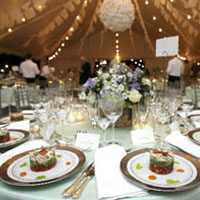The Pivotal Role of A Wedding Caterer
 Food is often what makes a wedding really stand out. There are several central themes that make weddings somewhat similar to one another. The wedding ceremony has several similarities, although they may be a few traditions that set one apart from the other. The decor often has several common elements. However, though there is bound to be plentiful food at all weddings, the types of food served and the spread will vary.
Food is often what makes a wedding really stand out. There are several central themes that make weddings somewhat similar to one another. The wedding ceremony has several similarities, although they may be a few traditions that set one apart from the other. The decor often has several common elements. However, though there is bound to be plentiful food at all weddings, the types of food served and the spread will vary.
No matter how much interest there is in the wedding ceremony, everyone really looks forward to the food that will be served. Wedding food is always special since the occasion demands a lavish menu and rich, luxurious foods.
Most couples look for a wedding caterer outside of the venue. Though many venues come equipped with its own caterer, most people prefer using their own as it allows them much more variety and choice. Wedding spreads today are very grand – with several varieties of cuisine being woven in, and no two occasions serving the same type of food.
When looking for a wedding caterer, most opt for one single vendor to make all arrangements through the entire course of the wedding, including different occasions and venues such as the wedding, reception, sangeet and engagement. Working with one single caterer makes it easier to coordinate all arrangements, not to mention likely a better price. On the other hand, working with different caterers allows you the flexibility to offer guests many different types of food. This ensures that here is a different flavor profile for every meal and that the quality of the food is maintained at its highest level.
For those who are planning different menus and foods to be served at various functions, it is most important to keep in mind a few things. The first is the time of day. This will help you plan for the kind of food and the number of choices that should be made available for guests. For smaller functions that only last an hour or two or during odd times of the day, you may be able to serve appetizers and drinks, and avoid serving a meal altogether. Another option is to provide a simple spread that only contains one or two food choices.
The second consideration is to have a good balance between vegetarian and non-vegetarian dishes. Several communities and lots of groups try and stick to vegetarian fares through all functions, or at least for the wedding. Depending on what you opt for, ensure that there is enough for all. Depending on your guests, you may want to have one station especially for jains, where the food is cooked without onions and garlic. Some even include options that are simple and suited for children.
During the course of your wedding planning, be sure to set up two to three meetings with the caterer. Spend some time deciding what is best for each occasion. Take into account seasonal foods and make them available. You may like to use them in the main course or dessert. Be attentive to the caterer and ask about their specialties. If it is possible, look to have a live counter during at least one of the celebrations, as many guests really enjoy the interactive experience.
When discussing wedding catering, dessert plays an important role. Many look forward to nothing but the dessert counter at all weddings. If you are keen on a particular caterer, but are not happy with the kind of dessert options that are available, look for a separate vendor. Ensure that you have a good mix of hot and cold desserts as well as a variety of Indian and western ones.
If your wedding is outdoors, ensure that the caterer knows well ahead of time so he can prepare his food and plan accordingly. The climate of the outdoors is very different from the dynamics of having to serve food indoors. It may also be a good idea to take the caterer to the locations beforehand, so they have a better idea of how they should go about planning as well as where they can set up their stations.
 When choosing a wedding caterer, first look into their track record and reputation. Always choose someone who comes highly recommended, or someone whose food you have tasted and for whom you can vouch. The next most important thing to ensure is that the caterer and the venue provider meet at least once so they are completely in agreement with the demands of the occasion. The last thing you want is to have your caterer come to the venue with the food and then run into trouble with the venue management regarding serving. What is most important at your end is to have at least one food-tasting occasion. Especially for main events like the wedding and reception, be sure to taste every item on the menu before approving it.
When choosing a wedding caterer, first look into their track record and reputation. Always choose someone who comes highly recommended, or someone whose food you have tasted and for whom you can vouch. The next most important thing to ensure is that the caterer and the venue provider meet at least once so they are completely in agreement with the demands of the occasion. The last thing you want is to have your caterer come to the venue with the food and then run into trouble with the venue management regarding serving. What is most important at your end is to have at least one food-tasting occasion. Especially for main events like the wedding and reception, be sure to taste every item on the menu before approving it.
Once you have everything in order, you can only hope that all goes well and the food turns out as planned. If you have a good caterer who is known for precision and high standards, you have little to worry about. When you have made certain that all the foods are good enough to serve to your guests, the wedding and its gastronomic delights are sure to overwhelm everyone in attendance.

















